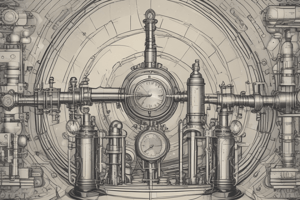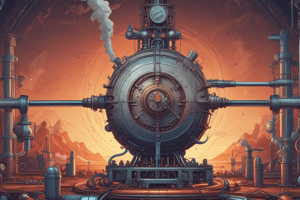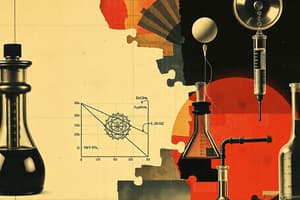Podcast
Questions and Answers
What causes a gas to exert pressure?
What causes a gas to exert pressure?
- Density
- Temperature
- Collisions (correct)
- Elevation
The SI unit for pressure is
The SI unit for pressure is
- Newton
- mm Hg
- Pascal (correct)
- Liter
The pressure exerted by a gas does not depend on
The pressure exerted by a gas does not depend on
- Temperature
- Volume
- The number of moles present
- The identity of the gas (correct)
At sea level, the average height of mercury in a barometer is
At sea level, the average height of mercury in a barometer is
Standard temperature and pressure are
Standard temperature and pressure are
Which of the following is not a unit of pressure?
Which of the following is not a unit of pressure?
A pressure of 760.0 mm Hg is equal to
A pressure of 760.0 mm Hg is equal to
A pressure of 20 torr is equal to
A pressure of 20 torr is equal to
Who developed the concept that the total pressure of a mixture of gases is the sum of their partial pressures?
Who developed the concept that the total pressure of a mixture of gases is the sum of their partial pressures?
Gases collected by water displacement contain
Gases collected by water displacement contain
The three states of matter of a particular substance, in order of the strength of intermolecular forces from least to greatest, are
The three states of matter of a particular substance, in order of the strength of intermolecular forces from least to greatest, are
The smallest portion of a crystal lattice that shows the three-dimensional pattern of the entire lattice is called the
The smallest portion of a crystal lattice that shows the three-dimensional pattern of the entire lattice is called the
The actual yield of a chemical reaction is generally
The actual yield of a chemical reaction is generally
Equilibrium is characterized by
Equilibrium is characterized by
The amount of energy needed to melt one mole of a substance is its molar
The amount of energy needed to melt one mole of a substance is its molar
A hypothetical gas that perfectly fits all the assumptions of the kinetic molecular theory is known as
A hypothetical gas that perfectly fits all the assumptions of the kinetic molecular theory is known as
Water's relatively high boiling point is the result of
Water's relatively high boiling point is the result of
Diffusion is much slower in liquids than in gases because
Diffusion is much slower in liquids than in gases because
The bond between oxygen and hydrogen in a water molecule is
The bond between oxygen and hydrogen in a water molecule is
For a fixed amount of gas at a constant temperature, the volume increases as the pressure
For a fixed amount of gas at a constant temperature, the volume increases as the pressure
The direct relationship between temperature and volume is known as
The direct relationship between temperature and volume is known as
Raising the temperature of a gas from 0ºC to 273ºC at constant pressure causes the volume to
Raising the temperature of a gas from 0ºC to 273ºC at constant pressure causes the volume to
Absolute zero is equal to
Absolute zero is equal to
The equivalent value of 273.15 K is
The equivalent value of 273.15 K is
Gay-Lussac's law shows the direct relationship between temperature and
Gay-Lussac's law shows the direct relationship between temperature and
A graph of pressure versus temperature in kelvins of a gas at constant volume and fixed mass is a(n)
A graph of pressure versus temperature in kelvins of a gas at constant volume and fixed mass is a(n)
The combined gas law is expressed by
The combined gas law is expressed by
Assuming all other conditions are constant, what is the new pressure of a gas if the original pressure is 50 kPa and the Kelvin temperature is doubled?
Assuming all other conditions are constant, what is the new pressure of a gas if the original pressure is 50 kPa and the Kelvin temperature is doubled?
A pressure of 20 torr is equal to
A pressure of 20 torr is equal to
The kinetic-molecular theory of gases assumes that the particles of an ideal gas are separated by great distances. This implies that the gas particles are considered to have no definite ______.
The kinetic-molecular theory of gases assumes that the particles of an ideal gas are separated by great distances. This implies that the gas particles are considered to have no definite ______.
If a gas and a liquid are the same temperature and pressure, diffusion occurs much faster in the gas because
If a gas and a liquid are the same temperature and pressure, diffusion occurs much faster in the gas because
If the particles in a sample of matter are attracted to each other but can move past each other easily, the matter is a
If the particles in a sample of matter are attracted to each other but can move past each other easily, the matter is a
Which gas is most likely to deviate from ideal gas behavior?
Which gas is most likely to deviate from ideal gas behavior?
When there is a small decrease in temperature, the average kinetic energy of the particles of a liquid
When there is a small decrease in temperature, the average kinetic energy of the particles of a liquid
Covalent molecular crystals have very low melting points, while covalent network crystals have very high melting points because
Covalent molecular crystals have very low melting points, while covalent network crystals have very high melting points because
Water has an unusually high molar enthalpy of vaporization because of its
Water has an unusually high molar enthalpy of vaporization because of its
At the same temperature and pressure, balloons of equal volume always contain
At the same temperature and pressure, balloons of equal volume always contain
The person who established that water must contain twice as many hydrogen atoms as oxygen atoms was
The person who established that water must contain twice as many hydrogen atoms as oxygen atoms was
The coefficients in a balanced chemical equation involving diatomic gases indicate the relative numbers of all of the following except
The coefficients in a balanced chemical equation involving diatomic gases indicate the relative numbers of all of the following except
The volume of 1 mol of any gas at STP is
The volume of 1 mol of any gas at STP is
Which law implies that the volume of a gas is directly proportional to the number of moles of the gas?
Which law implies that the volume of a gas is directly proportional to the number of moles of the gas?
The ideal gas law states the relationship among
The ideal gas law states the relationship among
If the pressure and temperature are kept constant, gases react in volume proportions that are
If the pressure and temperature are kept constant, gases react in volume proportions that are
Which is one way of expressing the units for the ideal gas constant?
Which is one way of expressing the units for the ideal gas constant?
In gas stoichiometry problems, the bridge between moles and volume is the ______.
In gas stoichiometry problems, the bridge between moles and volume is the ______.
The value of the gas constant is
The value of the gas constant is
The ideal gas law combines Boyle's law, Charles's law, Gay-Lussac's law, and __________.
The ideal gas law combines Boyle's law, Charles's law, Gay-Lussac's law, and __________.
Which of the following is true for the melting and freezing points of a pure substance?
Which of the following is true for the melting and freezing points of a pure substance?
Sublimation involves changing from a
Sublimation involves changing from a
An increase in pressure exerted on a liquid does not compress the liquid as much as the same increase in pressure compresses a gas because
An increase in pressure exerted on a liquid does not compress the liquid as much as the same increase in pressure compresses a gas because
The process by which the particles of gas randomly pass through a tiny opening is called
The process by which the particles of gas randomly pass through a tiny opening is called
Gas molecules will diffuse faster if the
Gas molecules will diffuse faster if the
The gas law that states that the rate of effusion of a gas is inversely proportional to the square root of the molar masses of the gases is
The gas law that states that the rate of effusion of a gas is inversely proportional to the square root of the molar masses of the gases is
You are measuring the speeds of two particles at the same conditions. The more massive particle will move
You are measuring the speeds of two particles at the same conditions. The more massive particle will move
The kinetic energy of the particles in a gas can be expressed as
The kinetic energy of the particles in a gas can be expressed as
The average kinetic energy of the particles in any gas depends only on the
The average kinetic energy of the particles in any gas depends only on the
The rate of effusion of a gas does not depend on
The rate of effusion of a gas does not depend on
Graham's law of effusion is derived from
Graham's law of effusion is derived from
Which of these gases diffuses fastest under the same conditions?
Which of these gases diffuses fastest under the same conditions?
Under which conditions does a real gas behave very much like an ideal gas?
Under which conditions does a real gas behave very much like an ideal gas?
The rates of effusion and diffusion depend on the what factor?
The rates of effusion and diffusion depend on the what factor?
Flashcards are hidden until you start studying
Study Notes
Gas Pressure and Behavior
- Gases exert pressure due to collisions between gas particles and the container walls.
- The SI unit for pressure is the Pascal (Pa).
- Pressure does not depend on the identity of the gas, but rather on temperature, volume, and the number of moles.
Standard Conditions and Units
- At sea level, a barometer measures an average mercury height of 760 mm, equating to 1.000 atm.
- Standard temperature and pressure (STP) are defined as 0ºC and 1 atm.
Gas Relationships and Laws
- The combined gas law expresses the relationship of pressure, volume, and temperature: (P1V1/T1) = (P2V2/T2).
- Charles's Law describes the direct relationship between temperature and volume.
- Gay-Lussac's Law illustrates the direct relationship between temperature and pressure.
Gas Properties
- The volume of 1 mole of any gas at STP is 22.41 L.
- The ideal gas law combines various gas laws and relates pressure, volume, temperature, number of moles, and the gas constant.
Diffusion and Effusion
- Diffusion occurs faster in gases than in liquids due to greater particle separation and motion.
- Effusion is the process where gas particles escape through a tiny opening; influenced by the rate described by Graham's Law.
Molecular Interactions
- Water's high boiling point is attributed to hydrogen bonding, a type of strong intermolecular force.
- The bond in a water molecule between oxygen and hydrogen is characterized as polar-covalent.
Kinetic Molecular Theory
- Assumes that gas particles are far apart and have negligible volume compared to the total volume occupied by the gas.
- The average kinetic energy of gas particles depends solely on the gas temperature.
Real and Ideal Gases
- Real gases deviate from ideal behavior primarily at low temperatures and high pressures, while ideal gases behave reliably under high temperatures and low pressures.
Chemical Reactions and Yield
- The actual yield in a reaction is often less than the theoretical yield.
- Equilibrium occurs when opposing processes occur at equal rates, maintaining balance in a closed system.
Particle Behavior
- Larger gas particles move slower than smaller ones under the same conditions, based on their mass.
- As temperature increases, gas diffusion rates also increase due to higher particle velocities.
Unit Conversions
- The conversion from torr to Pa indicates that 1 torr is approximately equal to 133.322 Pa.
- Understanding gas stoichiometry requires using the ideal gas law as a bridge between moles and volume.
Additional Concepts
- Sublimation refers to the transition of a substance from a solid to a gas without passing through the liquid state.
- The three states of matter, ranked by the strength of intermolecular forces, are gas, liquid, and solid (from least to greatest).
Studying That Suits You
Use AI to generate personalized quizzes and flashcards to suit your learning preferences.




